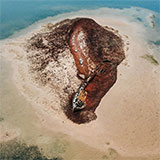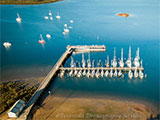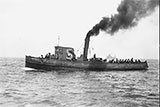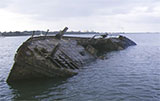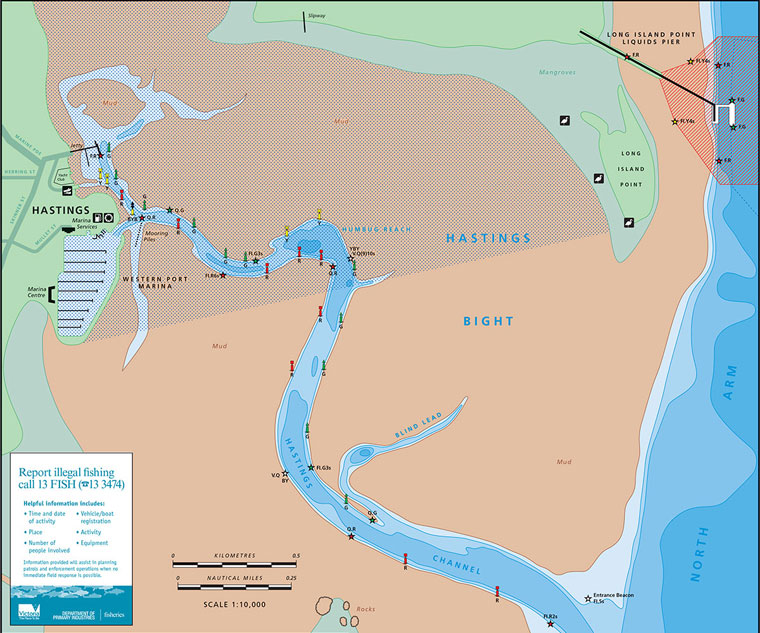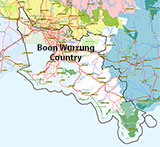Red Bird
![]() Wreck |
Wreck | ![]() Shore access
Shore access
![]()
![]()
![]()
![]()
Steel Steam Tug | Max Depth: 0 m (0 ft)
The Red Bird shipwreck (aka Redbird) is located about 280 metres east of Hastings Pier in Western Port, Victoria. The steam tug Red Bird broke free from its moorings in the 1940s and ended up on a sandbank. It was abandoned.
Early pictures show the Red Bird beached on the sandbank, mostly submerged, and tilted over 45 degrees. Back then it was an interesting dive site with a maximum depth of 4–5 metres. Now it has been all but consumed by the sandbank.
Diving and Snorkelling the Red Bird Shipwreck
Given the Red Bird shipwreck is now almost entirely buried in the sand, it's not really a dive anymore.
You can enter the water at Hastings Pier and snorkel or dive out to the sandbank, exit the water, and take a look around the shipwreck. Or, you can get out to the sandbank in a boat.
See WillyWeather (Hastings) as a guide for the tide times and the height of the tide.
The Red Bird lies in a high traffic boating area. For your own safety, you must use a surface dive float with a dive flag.
Red Bird Shipwreck History — Built in 1915
Red Bird was built in 1915, at Williamstown Naval Dockyard, Point Gellibrand, Victoria as a steel hull, single screw, steam tug and originally named ANZAC. She was 70.5 ft (21 m) long, with a beam of 14 ft (4.27 m), and a depth of 6.7 ft (2.04 m). Gross tonnage was 57, and the steam engine produced 60 horse power.
The federal government passed legislation in 1920 prohibiting the use of the name ANZAC for commercial purposes. As a result, the vessel was renamed Red Bird.
The Red Bird tug was operated by the Melbourne Harbour Trust until 1934 when it was sold to a Mr J.L. Dyson who planned to convert it into a commercial fishing vessel. This plan never came to fruition. The vessel was laid up in Western Port.
Red Bird Sinking — 1940s
At some time during the 1940s, Red Bird broke free from its moorings during a gale and drifted onto a sandbank to the east of Hastings and was abandoned.
See also Heritage Council Victoria: Redbird, and
Australian National Shipwreck Database: Redbird.
Heritage Warning: Any shipwreck or shipwreck relic that is 75 years or older is protected by legislation. Other items of maritime heritage 75 years or older are also protected by legislation. Activities such as digging for bottles, coins or other artefacts that involve the disturbance of archaeological sites may be in breach of the legislation, and penalties may apply. The legislation requires the mandatory reporting to Heritage Victoria as soon as practicable of any archaeological site that is identified. See Maritime heritage. Anyone with information about looting or stolen artefacts should call Heritage Victoria on (03) 7022 6390, or send an email to [email protected].
Traditional Owners — This dive site is in the traditional Country of the Boon Wurrung / Bunurong people of the Kulin Nation. This truly ancient Country includes parts of Port Phillip, from the Werribee River in the north-west, down to Wilson's Promontory in the south-east, including the Mornington Peninsula, French Island and Phillip Island, plus Western Port. We wish to acknowledge the Boon Wurrung as Traditional Owners. We pay respect to their Ancestors and their Elders, past, present and emerging. We acknowledge Bunjil the Creator Spirit of this beautiful land, who travels as an eagle, and Waarn, who protects the waterways and travels as a crow, and thank them for continuing to watch over this Country today and beyond.
Red Bird Location Map
Latitude: 38° 18.515′ S (38.308584° S / 38° 18′ 30.9″ S)
Longitude: 145° 12.126′ E (145.202101° E / 145° 12′ 7.56″ E)
Datum: WGS84 |
Google Map
| Get directions
Added: 2021-05-24 16:51:04 GMT, Last updated: 2022-04-29 17:35:58 GMT
Source: Google Earth
Nearest Neighbour: Hastings Pier, 268 m, bearing 279°, W
Steel Steam Tug.
Built: Williamstown, Victoria 1915.
Sunk: 1940s.
Hastings, Mornington Peninsula, Western Port.
Depth: 0 m.
[ Top ]
DISCLAIMER: No claim is made by The Scuba Doctor as to the accuracy of the dive site coordinates listed here. Should anyone decide to use these GPS marks to locate and dive on a site, they do so entirely at their own risk. Always verify against other sources.
The marks come from numerous sources including commercial operators, independent dive clubs, reference works, and active divers. Some are known to be accurate, while others may not be. Some GPS marks may even have come from maps using the AGD66 datum, and thus may need be converted to the WGS84 datum. To distinguish between the possible accuracy of the dive site marks, we've tried to give each mark a source of GPS, Google Earth, or unknown.

